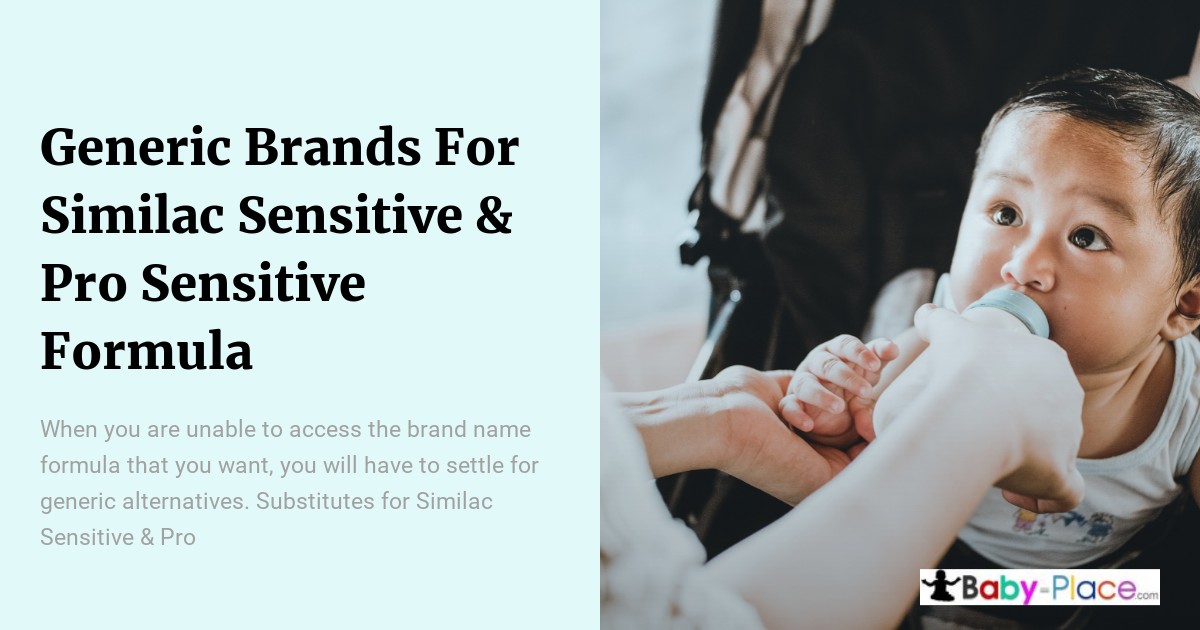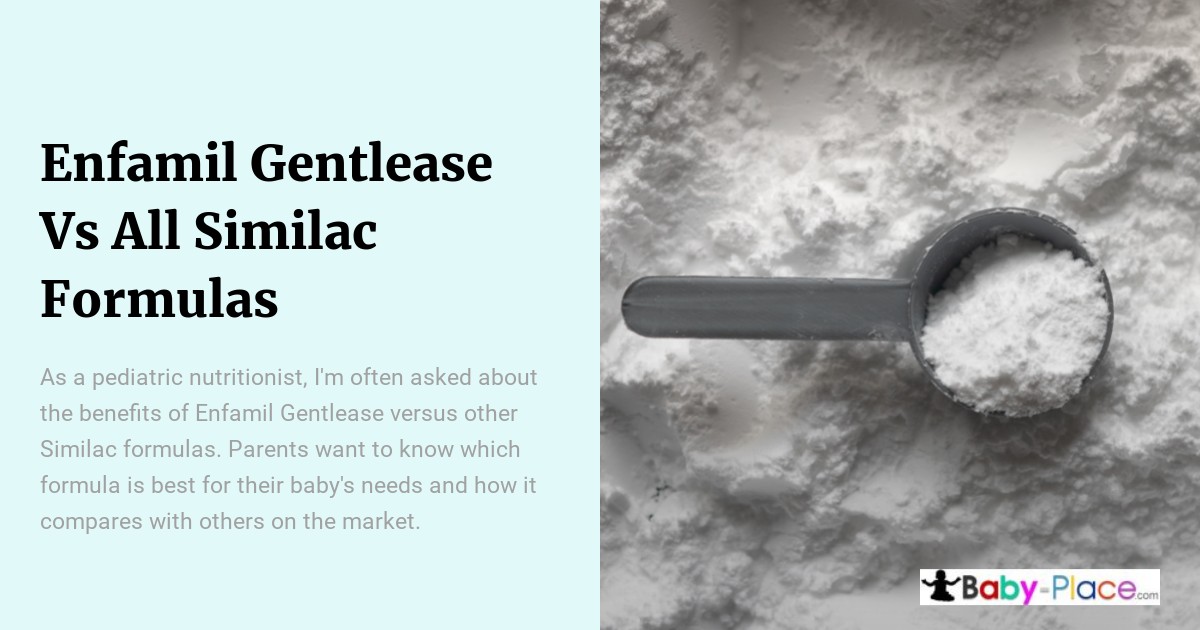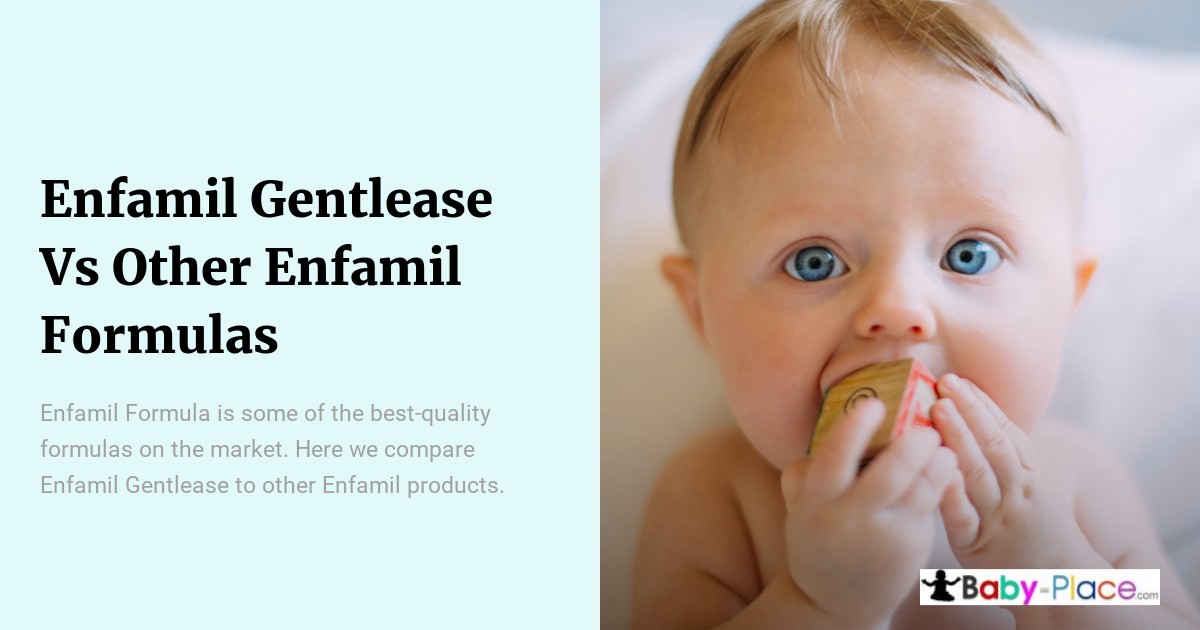As an infant nutrition expert, I understand the importance of finding a formula that provides essential nutrients while being gentle on sensitive tummies. Similac Sensitive & Pro Sensitive are popular formulas designed to meet these needs.
However, some parents find them expensive and may seek more cost-effective alternatives. In this article, I will explore generic brands for Similac Sensitive & Pro Sensitive Formula and provide helpful insight into their potential benefits or drawbacks.
Overview Of Infant Formula
The arrival of a new baby is an exciting yet overwhelming experience. As parents, we want to do everything in our power to provide the best nutrition for our children and help them reach their full potential. That’s why it’s so important to know about infant formulas, as they can be a great supplement or alternative when breastfeeding isn’t possible or practical.
Similac Sensitive and Similac Pro-Sensitive are two popular brands of formula designed specifically for babies with sensitive stomachs. They contain easy-to-digest proteins that have been broken down into smaller pieces compared to traditional cow milk-based formulas.
Enfamil Gentlease is another brand offering similar benefits but contains more carbohydrates than Similac products. All three options are nutritionally complete and meet all the American Academy of Pediatrics (AAP) requirements.
Store brand formulas offer good value, but may not include ingredients such as DHA and ARA which can play a role in brain development like those found in major name brands including Similac Sensitive and Similac Pro-Sensitive. Ultimately, while breastmilk remains the gold standard in infant nutrition, there are many quality alternatives available today if needed.
Similac Sensitive & Pro Sensitive Formula Basics
Similac Sensitive & Pro Sensitive Formula is a brand of infant formula designed to provide complete nutrition for babies. It contains all the essential vitamins, minerals, and nutrients needed for healthy growth and development during infancy. In addition, it includes prebiotics that helps support digestive health. Similac Advance is also tailored to meet the unique nutritional needs of premature babies.
For those looking for an alternative, there are several generic brands available that give similar nutrition as Similac’s sensitive formulas. These include Enfamil NeuroPro, Gerber Good Start Soothe, Parent’s Choice Advantage, and Up & Up Gentle Infant Formula with Iron.
Each offers different levels of proteins, fats, carbohydrates, and other nutrients required for healthy baby growth.
Generic alternatives will typically cost less than name-brand formulas like Similac Pro Advance or Enfamil NeuroPro, however, parents should always read labels carefully before making their choice in order to ensure they’re providing their baby with proper nourishment. Ultimately, selecting a formula suitable for your child’s individual dietary needs is key to promoting healthy physical and cognitive development in infants.
Store Brand Vs Brand Name Options
| Quality | Store Brands | Brand Name |
|---|---|---|
| Nutritional Value | Generally good; however, some do not offer DHA/ARA Omega Fatty Acids | Highly regulated by FDA; all must meet standards set forth by AAFCO (Association of American Feed Control Officials) |
| Ingredients | Vary greatly across stores; always read labels closely | High quality ingredients; no artificial colors or sweeteners added |
| Taste | Not as pleasant as branded formulas | More pleasant taste than most store brands |
| Cost | Typically lower-cost alternative | Pricier option due to higher quality ingredients |
Parents can also find information regarding ingredients and essential nutrients contained in generic brands for Similac Sensitive & Pro sensitive Formula by visiting websites such as the American Academy of Pediatrics website. It is always recommended that parents read labels carefully before purchasing any products for their infants’ nutrition needs.
Comparing Milk And Corn Syrup Ingredients
As the saying goes, “you are what you eat”. This is especially true when it comes to infant nutrition. As parents prepare for their baby’s arrival they must consider a wide range of formulas and ingredients that can make or break a healthy start in life. One important comparison to make when selecting an appropriate formula is between milk-based and corn syrup-based products.
When comparing human milk and powdered formula, there are several key differences to note. Human milk contains lactose as its primary carbohydrate source, while most brands of powdered formula use corn syrup solids instead. Lactose sensitivity varies widely from child to child, so it’s important to take this into consideration when determining which kind of formula will best meet the needs of your baby.
Furthermore, some research has suggested that replacing lactose with other carbohydrates like corn syrup may have long-term implications on weight gain and metabolic health.
Human Milk Vs Cows Milk Protein Variations
When considering the nutritional profile of infant formula, it is important to consider the differences in protein sources between human milk and cow’s milk. With an increasing baby formula shortage worldwide, parents are turning to cow’s milk-based formulas such as Similac Pro Sensitive and Enfamil Nutramigen to feed their children.
| Human Milk | Cows Milk Protein Variations |
|---|---|
| Alpha Lactalbumin | Whey |
| Beta-Lactoglobulin | Casein |
| Immunoglobulins | Albumin |
| Lysozyme | Globulins |
Human milk contains two major proteins: alpha-lactalbumin and beta-lactoglobulin.
These proteins provide essential amino acids for growth and development and also contain immunoglobulins that help protect infants from infection. Additionally, lysozyme helps break down bacteria cells in the digestive tract which can reduce gastrointestinal irritation caused by certain foods or allergens.
Conversely, cows milk contains whey, casein, albumin, globulins, and other variations of proteins which may be more difficult for some babies to digest than those found in breastmilk. This difficulty could lead to colic like symptoms such as gas pain or excessive crying. In summary, although both human and cows milks provide nutrition necessary for a growing baby; there are stark differences in the types of proteins they each contain which could lead to digestive complications if not monitored closely by a doctor or pediatrician.
Organic Formula Options & Essential Elements
For parents looking for a more natural option when feeding their baby, organic formula is an ideal choice. Organic formulas are made without the use of synthetic ingredients, hormones, antibiotics and other commonly used additives found in conventional infant formula. These formulas often come from cows that feed on grass or hay rather than corn or soybeans as well as plants grown without any chemical fertilizers. With these higher standards for production, organic formulas tend to be pricier than traditional infant formula brands like Similac Sensitive & Pro-Sensitive Formula by Abbott Laboratories and Enfamil Alimentum by Abbott Nutrition.
Organic formulas also provide essential nutrients such as iron, vitamins A and D, calcium and zinc which support growth and development in infants. Additionally, some organic formulas contain prebiotics which help promote beneficial bacteria within the digestive system while others may have added probiotics to aid with digestion. Parents should take into account what type of additional benefits they’d like their baby to receive when selecting an organic formula brand such as Enfamil Enspire or Enfamil Nutramige.
When shopping around for organic formula it’s important to read labels closely so you can make sure your baby is getting all the nutrition they need. It’s also vital to remember that there are no scientific studies showing if one brand is superior over another but many experts do agree on one thing: breast milk is still the best source of nutrition for babies up until at least six months old!
Enfamil Gentlease Infant Formula Overview
Enfamil Gentlease Infant Formula is a complete nutrition formula that provides essential elements to support the health and growth of babies. It contains FL HMO, an immune-nourishing prebiotic previously only found in breastmilk, which helps strengthen baby’s digestive system. Enfamil Nutramige is also included, designed to be easy for baby’s developing digestion. This innovative blend makes it one of the gentlest formulas available on the market today.
In addition to its superior nutrition profile, Enfamil Gentlease includes DHA and ARA fatty acids which are known to promote brain development and eye health in infants. It is non-GMO, gluten free and lactose free – making it ideal for a variety of dietary needs or preferences. The powder form dissolves easily into water so can be quickly prepared as part of your baby’s mealtime routine.
Overall, Enfamil Gentlease has been developed with great care by experts in infant nutrition to provide babies with all the key nutrients they need during their first year of life while being gentle on their tummies. Its combination of quality ingredients means this baby food offers superior nutritional value and all round nourishment for newborns through 12 months old, meeting FDA regulations so you know your little one is getting the best possible start in life.
Similac Alimentum & Similac Pro Advance Alternatives
Parents of infants with sensitive stomachs or allergies to milk-based formulas may be interested in alternatives to Similac Alimentum and Pro Advance. Fortunately, there are several generic brands that offer similar formulations at a fraction of the cost. The following table lists some of these options:
| Brand | Product | Added Rice? |
|---|---|---|
| Enfamil | Nutramigen | Yes |
| Mead Johnson | Gentlease | No |
| Up & Up | Sensitive Formula | Yes |
All three products contain no artificial growth hormones, making them suitable for those who prefer natural ingredients. Furthermore, they provide essential vitamins and minerals needed by growing babies without added sugar or preservatives.
In comparison to Similac’s proprietary formulas, generic versions do not require special ordering and can usually be found at any major retail store. Plus, parents don’t have to worry about breaking their budget when it comes time to buy more formula!
Generic brands are an excellent way for parents to ensure their baby is receiving nutritious meals while still saving money. With so many quality alternatives available today, finding a suitable sensitive formula has never been easier.
Abbott Nutrition & Mead Johnson Complete Nutrition Solutions
As an infant nutrition expert, it’s important to consider the different types of formulas available for blind users. Abbott Nutrition and Mead Johnson offer complete nutrition solutions with their Similac Sensitive and Pro Sensitive formulas. These products are specifically designed for infants who have sensitive tummies or suffer from food allergies.
The Similac Sensitive formula is made without artificial ingredients, preservatives, or corn syrup solids. It contains a blend of prebiotics to help support digestive health while providing essential vitamins and minerals. The pro-sensitive version offers extra nutrients like DHA and ARA which can help promote brain development in young children. Both versions contain iron to provide energy throughout the day and zinc to help support healthy immune systems.
These brands also prioritize safety and quality assurance with their nutritional offerings as they use only non-GMO ingredients that meet strict standards set by regulatory agencies. In addition, each product undergoes extensive testing before being released into the market, ensuring that parents get only the best nutrition options for their little ones.
Baby Food Shortage & Artificial Growth Hormones Overview
The baby food industry is plagued with shortages, most notably in the area of Similac Sensitive and Pro-Sensitive formula. Unfortunately, this has led to an increase in generic brands being offered which may not provide the same benefits as Similac brand products. It is important for parents to be informed about these potential risks when looking for alternative sources of nutrition for their babies.
When researching alternatives to Similac’s sensitive formulas, it’s essential to look into the ingredients used by each brand. Generic versions often contain artificial growth hormones that can have adverse effects on your child’s development over time. Additionally, some generic brands are made from lower quality milk or other animal proteins than what would be found in a name-brand product like Similac Sensitive or Pro-Sensitive.
Ultimately, parents should make sure they are well informed before making any decisions regarding infant nutrition and supplementing with generic brands of formula such as those designed for Similac’s sensitive line. This will help ensure they are providing their baby with all the necessary nutrients while avoiding potentially harmful additives and preservatives. With proper research, parents can find safe options that still meet their budget needs without sacrificing quality nutrition for their little ones.
Powdered Formula Advantages For Blind Users
Powdered formulas, such as those available from Similac Sensitive and Pro-Sensitive, offer a number of advantages for blind users. Firstly, powdered formulas are typically more affordable than their pre-made liquid counterparts. This makes them an attractive option for parents on a budget who want to provide the best nutrition possible for their child. Secondly, powdered formula containers are much easier to store than bulky bottles or cans of ready-to-drink formula. The ability to stack these containers in cupboards or closets can be especially helpful for visually impaired individuals who may have difficulty locating and organizing items in their kitchen. Lastly, due to their smaller size and lighter weight, it is much simpler for blind users to take powdered formula with them when travelling away from home. With some careful planning and preparation, this allows parents to ensure that they always have adequate nutrition on hand wherever they go.
For blind users seeking the most convenient way to feed their infant, using powdered formula provides numerous advantages over other types of infant nutrition products. These range from cost savings through lack of bulkiness and weight when transporting the product elsewhere. As such, it’s clear why many visually impaired parents choose Similac Sensitive and Pro-Sensitive powder formulas as part of their baby’s daily diet plan.
Lactose Sensitivity In Different Types Of Formulas
Once we have explored the advantages of powdered formula for blind users, it is important to look at how different types of formulas respond to lactose sensitivity in infants. Lactose intolerance can cause a variety of issues ranging from bloating and stomach discomfort to more serious health concerns such as dehydration or malnourishment. In order to determine which type of formula best fits an infant’s needs, it is necessary to understand the levels of lactose present in each kind.
The following table provides information about the amount of lactose found in several popular brands of formula:
| Brand | Type | Amount of Lactose (g/100mL) |
|---|---|---|
| Similac Sensitive | Milk-based | 6 |
| ProSensitive | Milk-based | 4 |
| Enfamil Gentlease | Milk-based | 7 |
| Gerber Good Start Soy | Soy-based | 0.5 |
As you can see, both Similac Sensitive and ProSensitive offer milk-based formulas with low amounts of lactose per 100 mL serving. However, Gerber’s Good Start Soy offers a soy-based option that has no lactose at all. This makes it ideal for infants who are particularly sensitive to dairy products and may experience adverse reactions when consuming milk-based formulas like those offered by Similac and Enfamil. For parents looking for an alternative that does not contain any lactose, this is certainly worth considering.
Ultimately, finding the right formula for your baby will depend on their individual needs and sensitivities. If your infant experiences distress after drinking milk or other dairy products, then switching them over to a soy or hypoallergenic product might be beneficial. Consulting with your pediatrician is always recommended if you have questions or concerns regarding your child’s nutrition needs.
Customer Service And Product Quality Concerns
When it comes to customer service and product quality, parents should be reassured that generic brands of Similac Sensitive & Pro Sensitive formulas are just as safe and effective as the name brand. All infant formula products must meet FDA requirements for nutrient content, so there is no difference in safety or nutritional value between different brands. It is important for parents to note that label claims may vary slightly from one manufacturer to another due to differences in ingredient sourcing and processing techniques; however, these variations should not affect the overall quality of the product.
Parents can also rest assured that generic versions of Similac Sensitive & Pro Sensitive formulas come with excellent customer support services. Many manufacturers provide phone lines dedicated solely to answer questions related to their products, while some even offer home-delivery options straight from the company’s website. In addition, many retailers selling generic versions of Similac have knowledgeable staff members who can help educate customers on which particular type best suits their needs.
It is always wise for parents to do research before making any purchases when shopping for infant formula, but they should feel comfortable knowing that generic brands of Similac Sensitive & Pro Sensitive formula are just as safe and reliable as their branded counterparts. With proper advice from healthcare professionals and a bit of consumer education, parents will be able to make informed decisions about what type of infant nutrition products best suit their child’s unique dietary needs.
Organic Formula Benefits For Long-Term Health
Organic formulas can provide long-term benefits for infants’ health. Many parents may worry that organic formula is more expensive than generic brands, but when you look at the big picture of an infant’s overall health and well-being, investing in a quality product pays off. Organic formulas are made with all natural ingredients sourced from sustainable farms and contain no synthetic additives or preservatives. These ingredients not only support healthy development, they also help to reduce exposure to potential toxins and allergens that could have lasting effects on an infant’s immune system.
A key benefit of opting for an organic formula over a generic brand is that it provides greater nutrient density. This means our little ones get more vitamins, minerals, and other important nutrients per scoop compared to non-organic alternatives – helping them reach their full growth potential as quickly as possible. Also, because these products are free from added sugars like corn syrup solids found in some standard formulas, there’s less risk of developing digestive issues such as bloating or constipation down the line.
Ultimately, parents who choose organic formula for their babies can rest assured knowing they’re providing superior nutrition tailored specifically for the needs of growing children–a choice which will undoubtedly pay dividends when it comes to their child’s future wellness and vitality.
Conclusion
In conclusion, infant formula is an important part of a baby’s nutrition. It’s critical to carefully consider the various types available and their unique ingredients in order to select one that meets your needs. When it comes to Similac Sensitive & Pro Sensitive Formula, generic brands are often just as good as brand name options when looking at comparable ingredients. However, product recalls do occur so keep up-to-date on any changes or alerts associated with the specific type you choose. Additionally, powdered formulas offer advantages for blind users due to ease of use and lactose sensitivity may be different between formulas so pay attention to these details if needed. Lastly, organic formulas can provide long-term health benefits but make sure customer service and product quality concerns have been addressed before making a purchase. As an infant nutrition expert, I hope this article has provided insight into choosing the right formula for your little one!
















